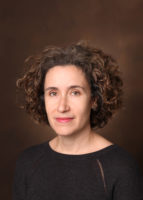The Rokhl Brokhes Project
About this Project
World War II and the Holocaust destroyed Yiddish cultural life in Eastern Europe, annihilating artists, writers, and audiences. Those who left before the war, those who escaped as refugees during the war, or those who survived the horror of war lived to tell the story of Yiddish in new cultural centers. Of those who perished in Eastern Europe we know too little. We know even less of the women writers of that era, especially those from the regions that became part of the Soviet Union. The canon of Soviet Yiddish is exclusively male and comprised of writers whose careers emerged by and large after the revolution, or in the years leading up to it.
This project seeks to transform the field of Russian and Soviet Yiddish literature by translating Rokhl Brokhes, a prolific Yiddish woman writer whose career spanned 1899 to her death in the Minsk ghetto during World War II (sources date her death as either 1942 or 1945). An eight-volume collection of her more than 200 stories, sketches, children’s tales, novellas, and plays was apparently scheduled for publication—indeed, the first volume may have been already typeset—when the German army invaded Minsk in 1941. Yet, this major writer, recognized as a significant artist in her lifetime, has nearly disappeared from Yiddish and Jewish cultural history. Not only was Brokhes herself murdered by the Nazis, but so were the plans for her collected works, a testament to a literary legacy that might once have seemed assured, but which would turn out to be so fragile, subject both to the violence towards Jews by the Nazis and to the erasure of the voices of women writers.
“The Storyteller from Minsk: The Selected Works of Rokhl Brokhes”
“The Storyteller from Minsk: The Selected Works of Rokhl Brokhes” will be the first to recover and translate the corpus of a major Russian Yiddish woman writer. The project will situate Brokhes in the fifty-year history of Minsk as a literary cultural site at the epicenter of a history of two revolutions, a civil war, and two world wars. Her stories offer new perspectives on the social and political conflicts in the pre- and post-revolutionary era, centering female characters to describe the transformations of modernity from a minority Jewish perspective. Her life and work have much to tell us about an extinguished Yiddish literary tradition, that included women writers at its center. Moreover, her narratives of domestic and sexual conflicts synthesize the experience of revolution and upheaval of the period.
About the Collaborators

Allison Schachter is Professor of Jewish Studies, English, and Russian and East European Studies at Vanderbilt University. She is the author of Diasporic Modernisms: Hebrew and Yiddish Literatures (Oxford 2012) and Women Writing Jewish Modernity, 1919-1939 (Northwestern 2022). Together with Jordan Finkin, she translated From the Jewish Provinces: The Selected Stories of Fradl Shtok (Northwestern 2021), whch was awarded the Modern Language Association’s Fenia and Yaakov Leviant Memorial Prize in Yiddish Translation.
 Jordan Finkin is Rare Book and Manuscript Library and Deputy Director of Libraries at the Hebrew Union College. A scholar of modern Jewish and Yiddish literatures, his most recent book is Exile as Home on the life and work of Yiddish poet Leyb Naydus. he is also the director of Naydus Press, a non-profit publisher of Yiddish literature in English translation.
Jordan Finkin is Rare Book and Manuscript Library and Deputy Director of Libraries at the Hebrew Union College. A scholar of modern Jewish and Yiddish literatures, his most recent book is Exile as Home on the life and work of Yiddish poet Leyb Naydus. he is also the director of Naydus Press, a non-profit publisher of Yiddish literature in English translation.